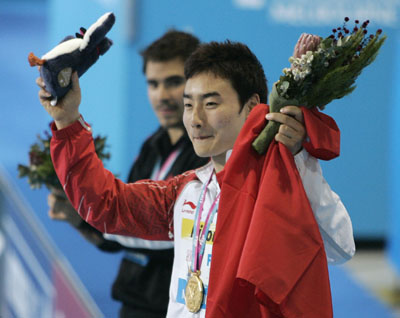China pockets more diving gold medals
(AP)Updated: 2007-03-23 21:43
MELBOURNE - Even a string of perfect 10s couldn't keep China from another diving gold medal.
China's He Zi won the women's 1-meter springboard title over two-time champion Blythe Hartley of Canada.
Qin earned two 10s on his final dive, having taken the lead from teammate He Chong after two rounds. Qin finished with 545.35 points.
Qin climbed out of the pool, did his traditional bow to the crowd and pumped his right fist knowing he had claimed his second gold in Melbourne.
Qin and Wang Feng won the 3-meter synchronized title.
Despatie, who swept the 1-meter and 3-meter titles in Montreal two years ago, couldn't make up enough points on his last dive. He edged Russia's Dmitry Sautin by 1.58 points for the silver.
Sautin, the old man of the competition at 33, received 10s from all seven judges on his fifth dive, a reverse 2{ somersault from the pike position. He threw his arms in the air while most of the crowd gave him a standing ovation.
But Qin was already too far ahead and even perfection didn't budge Sautin higher than third, where he had been lodged since the fourth round.
He Chong, the 1-meter silver medalist here, saved the hardest dive of the final for last - a forward 2{ somersault with three twists. His marks ranged from 7.5 to 9.0, but it wasn't enough to make up for badly missing his fourth dive. He ended up sixth.
In the women's final, He won with 316.65 points - 5.45 better than Hartley, who was the champion two years in Montreal and in 2001 in Fukuoka, Japan.
Yuliya Pakhalina of Russia took the bronze with 304.60.
He, a 16-year-old diving in her second major international meet, overtook Hartley for first place on her fourth dive. He's reverse 2{ somersault received 72.00 points - her highest score of the five-dive final. The dive had a 3.0 degree of difficulty, and along with her third dive worth 3.1, He pulled off the toughest two dives of the final.
He made her international debut last December at the Asian Games and won a silver medal, but she looked like a veteran against her older competition in the non-Olympic event.
"She is a girl who was absolutely fantastic," Hartley said. "I have a lot of respect for her."
Hartley led through three rounds and earned mostly 8.5s for her fourth dive. But He, diving last, did the more difficult dive, which propelled her into the lead for good.
"I was incredibly nervous on my fourth dive. It could have gone a little better," Hartley said. "There is always pressure to come in as a world champion and to defend your title."
Irina Lashko, the 2003 champion while diving for Australia, finished fifth. The 34-year-old, who also won in 1998, recently cut ties with her adopted country and returned to competing for her native Russia.
The only perfect 10.0 score in the final went to Anna Lindberg of Sweden, who received it on her final dive, lifting her into fourth.
"You could tell that they (the judges) wanted to make her third, so I decided not to let them have their fun and take things into my own hands," said Pakhalina, who received mostly 9.0s on her last dive.
Pakhalina said she heard other divers complaining about the judging.
"I don't really know, but everyone's saying that they were holding me down," she said. "We're talking about a dive that takes seconds, anything can happen. Someone wins, someone comes third."
Russia continued its domination in synchronized swimming when Anastasia Davydova and Anastasia Ermakova won the duet free. It was Russia's fifth gold in six events.
Davydova and Ermakova finished with 99.333 points, well ahead of the Spanish team of Gemma Civil Mengual and Paola Sanchez Tirados, who had 97.667. Japan's Ayako Matsumura and Emiko Suzuki took the bronze.
The two Russians also won the duet technical on Tuesday, with Spain and Japan also second and third. Synchronized swimming ends Saturday with the team free in which Russia is again heavily favored.
In women's water polo, Russia downed Spain 12-7, Australia trounced Brazil 11-3, the United States edged Greece 8-6 and Hungary beat Cuba 19-4 to top their groups and advance direct to the quarterfinals.
The second and third place-getters from each group advance to a second-round playoff Sunday for a chance to book a berth in the final eight.
|
||
|
||
|
|

